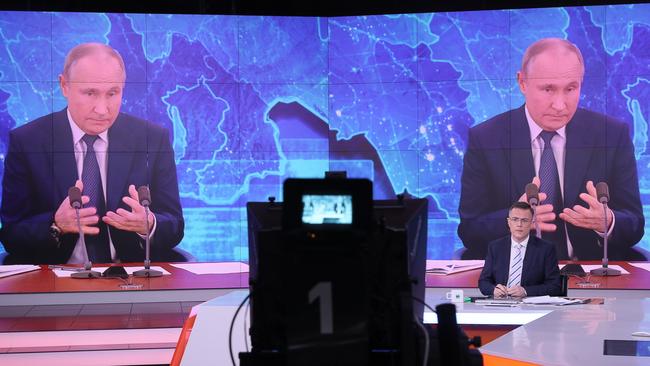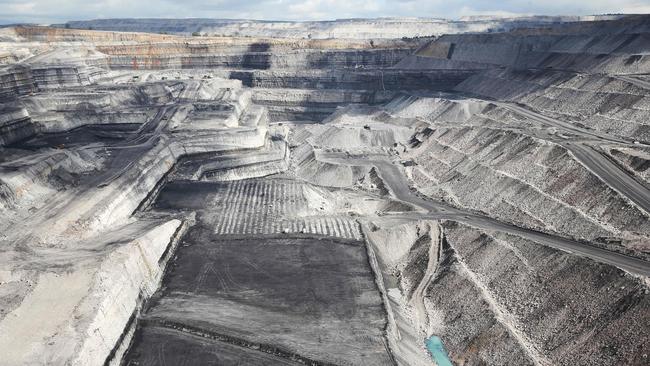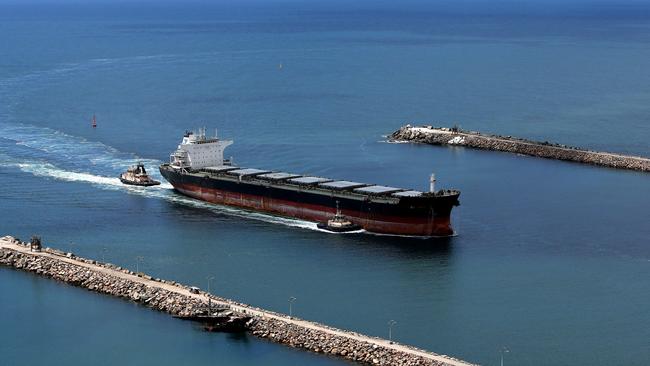Global scramble for Australian coal to replace Russian exports
Trade officials in talks with local coal producers as government co-ordinates efforts to find supply for Poland and Asian partners.

Business
Don't miss out on the headlines from Business. Followed categories will be added to My News.
Australian trade officials are in discussions with local coal producers as the federal government co-ordinates efforts to find supply for Poland and Asian trading partners amid a global scramble to replace Russian resources.
Officials from Austrade and the Department of Industry, Science, Energy and Resources have been in contact with coal miners this week, asking whether capacity was available to supply Polish utilities – and whether coal promised into existing contracts could be diverted to Europe temporarily due to the Ukraine crisis.
The calls were made after high-level approaches by the Polish government seeking alternative sources to Russian coal used for heating and power generation.
Resources Minister Keith Pitt confirmed the government was “facilitating access to Australian thermal coal producers to interested parties as they seek alternative supplies from Russia”.
“Australian producers have indicated they are willing to help our friends and allies if they can,” Mr Pitt told The Australian.
Russia supplies up to 90 per cent of Poland’s coal but the country’s government has led the European charge to impose sanctions on Russia in the wake of the invasion of Ukraine.
Last week Poland proposed coal be included in a European Union sanctions list despite its dependence on imports.
Industry sources say officials also sought information on whether coal supplies could be made available to customers in South Korea and Japan, following requests from their counterparts in those countries.
A number of major Australian coal producers confirmed they had been approached by Austrade and senior DISER officials, although each declined to comment on the discussions due to the sensitive nature of the requests.
Coal producers have promised to weigh the requests in consultation with their marketing and trading teams, but industry sources say additional supply is unlikely to become free for months, amid tight markets for coal and soaring global prices.

Australian coal miners have been running at full tilt for the last six months as the coal price has surged, and say there is little capacity in the system to lift export rates. There is an additional bottleneck at Australian ports, with the largest, the Port of Newcastle, at 93 per cent capacity. The Port of Brisbane is closed due to flooding.
Italy and Croatia may also follow Poland’s lead and ask Australian producers for additional tonnes to be sold to their economies, amid talk Italy is about to announce to return a mothballed coal plant in Trieste to service. Bulgaria is also said to be scouring global markets for new sources of coal supply.
While no sanctions have yet to be levied on Russian energy exports, sources say major buyers of Russian coal in Asia and Europe have already begun to cancel shipments and seek alternatives in anticipation the crisis in Europe will intensify, setting off a global scramble for supply.
Coal producers say they have also begun receiving requests for additional supplies of coking coal, though the urgency of the requests is said to be lower than that of those seeking thermal supplies.
Russia produces about 75 million tonnes of metallurgical coal a year, according to recent Macquarie figures, and about 360 million tonnes of thermal coal. About 40 per cent of its coking coal is sent into export markets, along with just under half of its thermal coal production.

The benchmark price for high quality Australian coal hit a record $US256 ($353) a tonne on Friday, and thermal coal prices delivered to Europe have jumped by $US80 in a week to $US285 a tonne on March 1. Forward curves for Australian energy coal have shot up beyond $US300 a tonne this week, industry sources say, with one shipment of high grade thermal coal from South Africa reported to have changed hands for as much as $US350 recently.
The shock return of war in Europe has forced a short-term reshaping of global energy trade routes outside of coal. Qatar is rerouting some LNG shipments bound for Asia to European customers, with Australian producers stepping into the gap to make up for the regional shortfall.
But the crisis brought on by Russia’s invasion of Ukraine is also forcing a broader rethink of energy policy in the EU and beyond.
German Economic Affairs Minister Robert Habeck told the country’s parliament that it needed a new energy masterplan to end its reliance on Russian gas exports, flagging a potential reversal of policies to phase out nuclear and coal power stations.

Germany’s remaining nuclear plants are due for closure by the end of the year, and it has previously signalled it intended to phase out its coal fleet by 2030 – instead planning to increase its use of Russian-supplied natural gas as a transition fuel.
But, under pressure from the US and other NATO allies, the German government halted work aimed at allowing Russia’s Nord Stream 2 gas pipeline into the European market, and the country now faces a scramble to build up a strategic stockpile of fuel and end its reliance on Russia for energy.
The latest crisis comes after a frenetic few years in international energy markets, after trade routes were up-ended by China’s ban on Australian coal. Queensland and NSW producers were forced to find new markets in Europe while Russian, US and Canadian producers pivoted to China, lured by the giant profits on offer.
Russia’s decision to invade Ukraine will again re-draw trade routes and further boost soaring prices and competition for supplies, including among some of Australia’s oldest customers in Japan, South Korea and Taiwan.
More Coverage
Originally published as Global scramble for Australian coal to replace Russian exports




